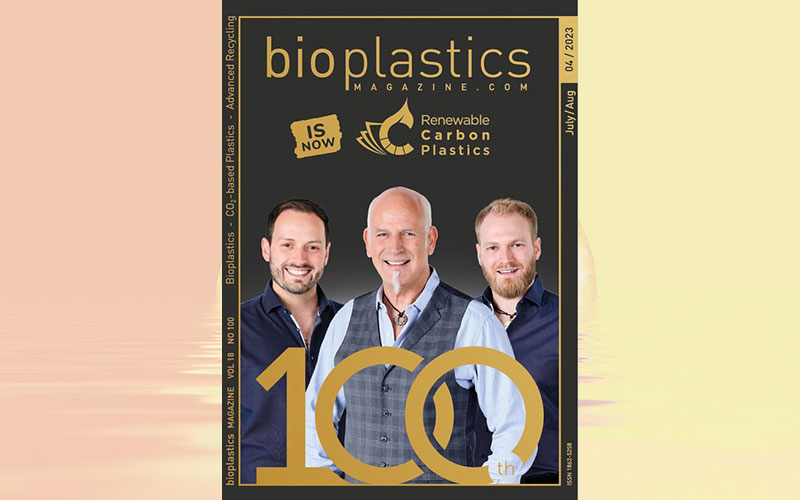bioplastics MAGAZINE will become Renewable Carbon Plastics
Since its founding in 2006, the global trade journal bioplastics MAGAZINE has informed readers across the globe about the latest developments in the fields of biobased plastics, biodegradable and compostable plastics, and plastics that are both. Now, with its 100th edition, the magazine rebranded to “Renewable Carbon Plastics” in August 2023.

100th issue marks the start of a new name
Since its founding in 2006, the global trade journal bioplastics MAGAZINE has informed readers across the globe about the latest developments in the fields of biobased plastics (i.e. plastics made from renewable raw materials rather than from petroleum), biodegradable and compostable plastics, and plastics that are both. Now, with its 100th edition, the magazine rebranded to “Renewable Carbon Plastics” in August 2023.
Almost everyone today will agree that plastics are indispensable materials for many applications. However, as long as these plastics are made from fossil-based resources, be is oil, gas or coal, they contribute to the depletion of scarce resources and, when finally disposed of, contribute to global warming.
Plastics made from biogenic sources (crops or waste streams) can be a good alternative. But the makers of bioplastics MAGAZINE recognized that these raw materials are not the only possible alternative.
The main objective is to avoid the new excavation of fossil resources from the ground. So, in addition to using biogenic resources, plastics made from direct carbon capture (CCU = Carbon Capture & Utilisation) is another viable way to avoid new fossil resources being used. Here carbon dioxide (CO2) from the atmosphere or exhaust processes or methane (C2H4) e.g. from biogasification, can be used to make plastic raw materials. Another alternative is certainly recycling.
That is why the editorial team of bioplastics MAGAZINE started about two years ago to broaden their scope of topics into plastics made from CCU and from Advanced Recycling. The latter comprises technologies such as chemical recycling, enzyme-based recycling, solvent based recycling and the like.
So, it comes to no surprise that the team behind bioplastics MAGAZINE has decided to change the title of the publication, as with this expanding range of topics, the name “bioplastics MAGAZINE” no longer rang true. The new name of this publication is now “Renewable Carbon Plastics – RCP”. Even if the 100th edition of bioplastics MAGAZINE represents issue number 1 of “Renewable Carbon Plastics”, this change will be a gradual one.
“We all know that bioplastics won’t be able to solve the problems we are facing by themselves”, says Alex Thielen, new Editor-in-Chief of RCP and son of founder Michael Thielen, “but cooperation and a combination of technologies will lead to the change we all hope to see – the name change is supposed to represent that philosophy”.









